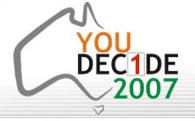Vancouver.
For the first paper session here at AoIR 2007 I thought I'd go to one of the sessions on blogging, which is opened by Mary-Helen Ward and Sandra West from the University of Sydney. Their paper is on blogging the PhD process, and mary begins by outlining the Australian PhD process itself (highlighting the thesis-based focus of Australian PhDs, the role of supervisors, and the as yet relatively unexamined pedagogy of the process). What has been suggested as pedagogical approaches are apprenticeship models, the idea of the autonomous scholar who needs to be 'discovered within' or at least discovered by the student, a more parental rite of passage model, a poststructural approach of students writing their selves into identity, as well as more recent peer learning or student/supervisor co-production models.














